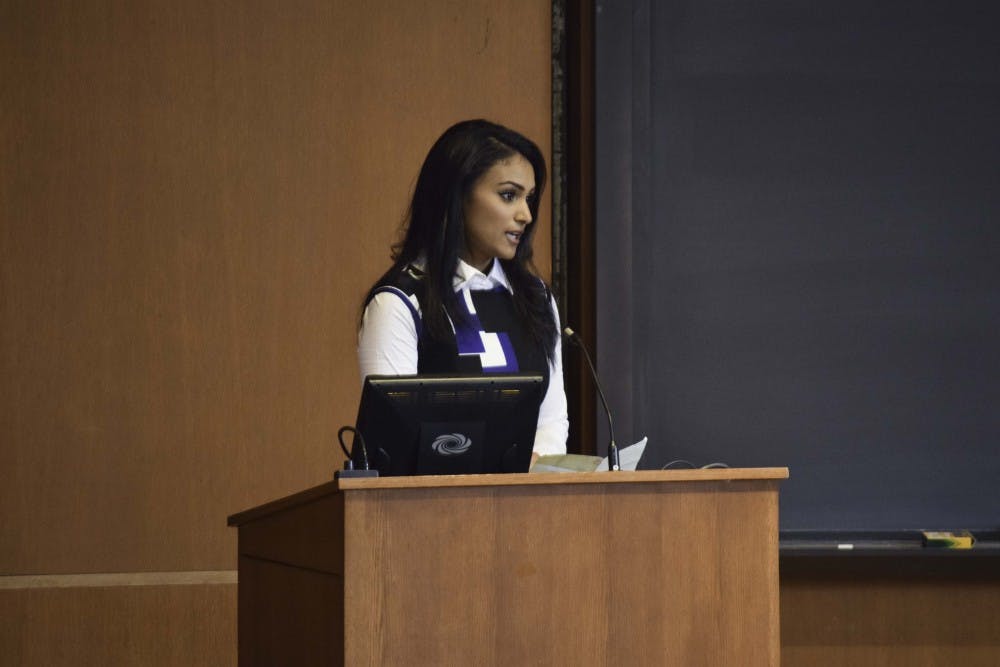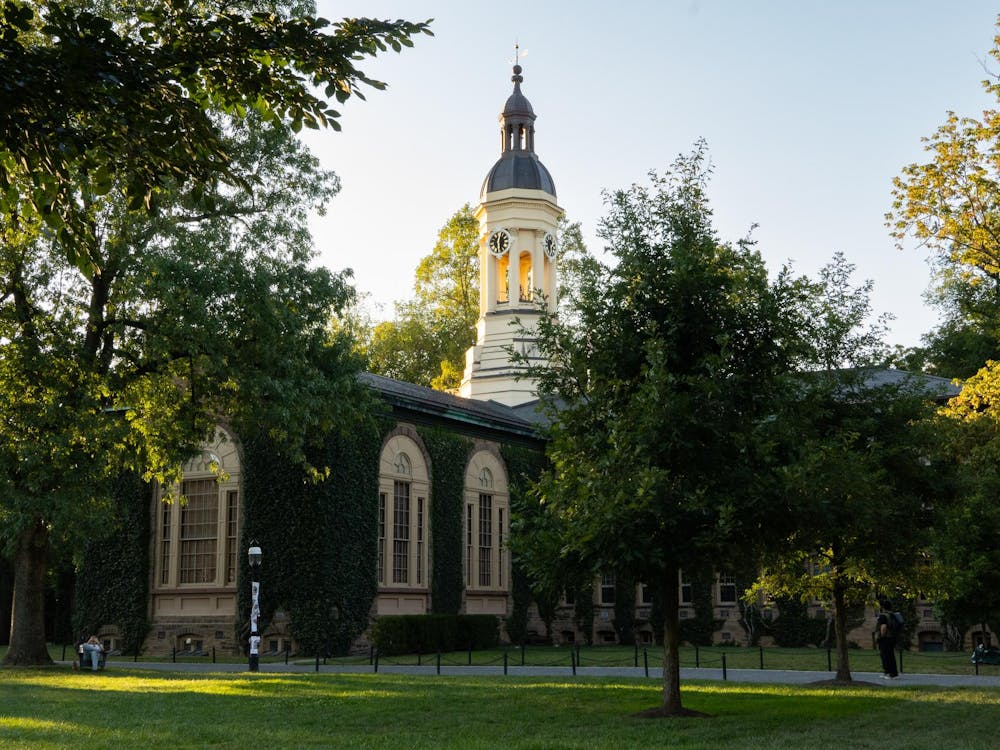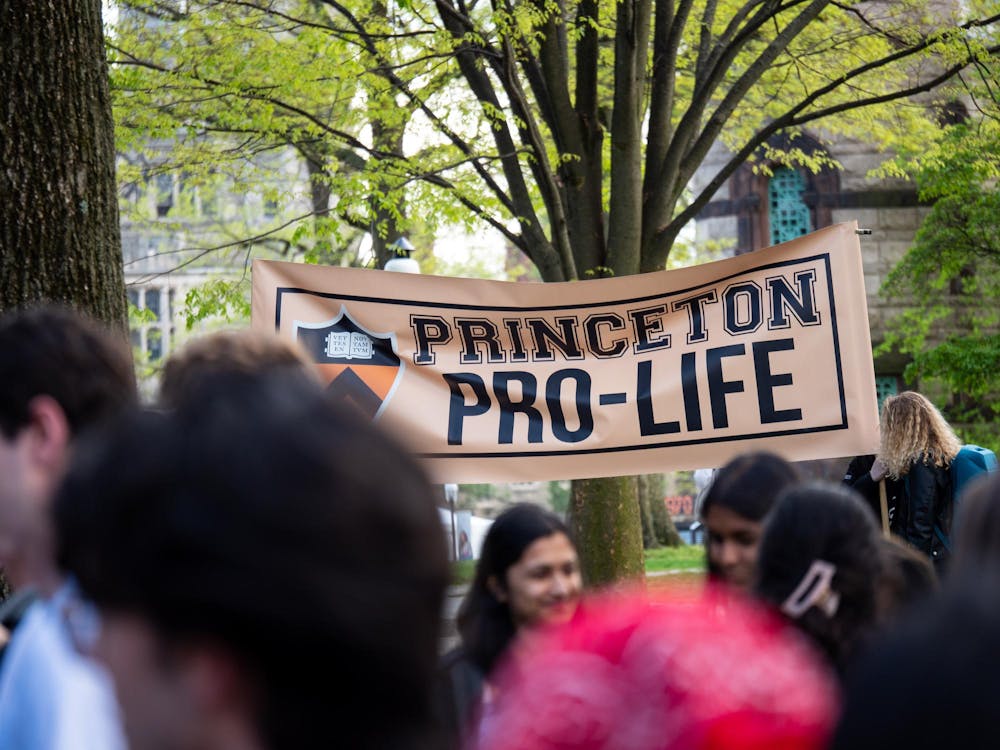As the first Indian-American to win the Miss America crown in 2014, Nina Davuluri said at a lecture on Tuesday that the Miss America Organization is often misunderstood.
“It felt so timely for this organization to finally reach out to a new demographic of young women that’s representative of what America is today," Davuluri said. "I grew up watching Miss America on TV, really legitimately feeling like I could never be in this role because I didn’t fit that stereotype. I didn’t fit the stereotypical blond hair, blue-eyed girl. I didn’t have a normal talent.”
She explained that as the only Indian girl in her classes at school, she constantly found herself correcting stereotypes about her background. She became the first person to perform a Bollywood dance at the pageant, she said, noting that she chose to do so because the dance represented a huge part of her identity and culture.
"I remember having tears in my eyes at the last bit of my performance because I felt like that was my crowning moment, for me to showcase who Nina was,” she said.
Her diversity-centered platform was a project she had been working on officially for seven years, she said, adding that she invested so much time in the Miss America organization because she believed that someone ethnic would soon win the competition.
Davuluri said that while there was a lot of backlash on social media when she won, there was also a lot of support from the younger generation.
"I can honestly say that for every one negative comment, tweet or post I received hundreds, if not thousands, of words of positive encouragement and support from specifically people our age,” she said.
Davuluri said she learned the value of perseverance when she was initially waitlisted at the University of Michigan, but was eventually able to transfer there from Michigan State University in her freshman spring.
“There are so many things that the first time you do it, it might not be the way that you wanted it to happen, but there’s different ways to get to the goal that you want,” she said."And it could be through the back door, it could be through many different ways."
Throughout college, Davuluri said she had an eating disorder. She added that it was difficult to talk to her parents about it as she did not feel understood.
"I think that mental health has such a stigma surrounding it globally that I hope will dissipate as more people talk about it," she said.

Davuluri added that her family had always pushed her towards the medical field, and that her parents did not tell anyone about her decision to compete for the title of Miss New York until she won it in 2013. Of her sixteen cousins, only one came to watch her compete at the Miss America pageant. Davuluri also recalled having several aunts who said that she would have been prettier if she were fairer.
Davuluri said that the hardest part of the national competition was the swimsuit session, even though it only took up 15 percent of the scoring. She said that she spent the most time preparing for this event, and was proud of being able to maintain her body afterward.
The crown brings a significant amount of pressure because there is always a question of how she wants to be perceived, Davuluri said.
"I feel like every time I come to an event or I do anything, there’s an expectation of who Miss America is going to be, what's she going to look like, what’s she going to wear, and that’s kind of something in people’s minds that I have to keep in mind as well,” she said.
Davuluri said that the Miss America pageant stands on the four pillars of service, scholarship, style and success.
She has earned upwards of $92,000 in scholarship funding since she began competing, she said,noting that one reason she entered the pageant was for the scholarship money.
Her work has involved an exhausting schedule that included traveling more than 250,000 miles and a year of service, she said.
“I will always say everyone wants to win Miss America, not everyone wants the job of Miss America,” she said.
Davuluri added that it was important to reach out to young girls and show them that they did not have to fit a stereotype or a certain role to become Miss America.
“That is essentially the spirit and the beauty of the American Dream — that regardless of your race, your religion, your socioeconomic status, anyone can come and work hard and pursue their dreams,” she said.
Titled “Celebrating Diversity Through Cultural Competency,” the event was sponsored by the Pace Center for Civic Engagement, Carl A. Fields Center for Equality and Understanding, the Princeton Women’s Mentorship Program, the Princeton Perspective Project, American Studies Program, Asian Pacific American Heritage Month Committee, Butler College, Whig-Clio, the Women’s Center, Gender and Sexuality Studies, Princeton Hindu Satsangam and the Hindu Life Program as part of Asian Pacific American Heritage Month.
The lecture took place on Tuesday at 4:30 p.m. in McCosh 10.









